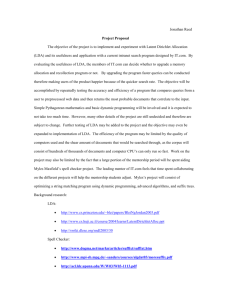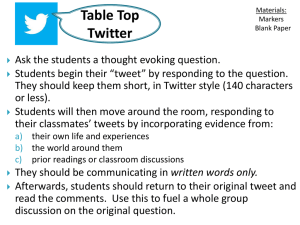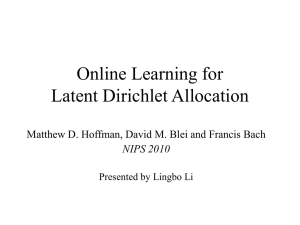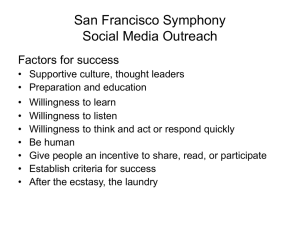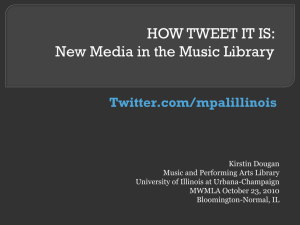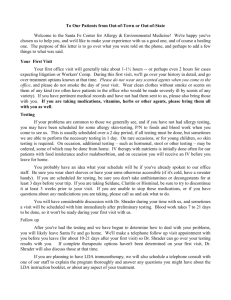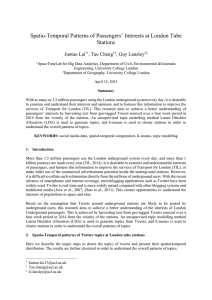Dynamic Multi-Faceted Topic Discovery in Twitter
advertisement
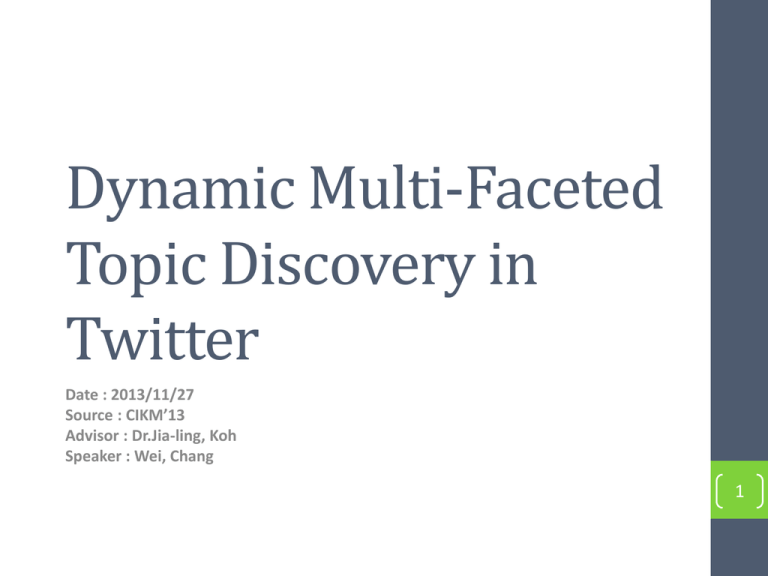
Dynamic Multi-Faceted
Topic Discovery in
Twitter
Date : 2013/11/27
Source : CIKM’13
Advisor : Dr.Jia-ling, Koh
Speaker : Wei, Chang
1
Outline
•
•
•
•
Introduction
Approach
Experiment
Conclusion
2
Twitter
3
What are they talking about?
• Entity-centric
• High dynamic
4
Multiple facets of a topic discussed
in Twitter
5
Goal
6
Outline
• Introduction
• Approach
•
•
•
•
Framework
Pre-processing
LDA
MfTM
• Experiment
• Conclusion
7
Framework
Pre-processing
Twitter
Training
document
Model
(hyper parameter)
Per document
Document
Vector
Pre-processing
Twitter
8
Pre-processing
•
•
•
•
•
Convert to lower-case
Remove punctuation and numbers
“Goooood” to “good”
Remove stop words
Named entity recognition
• Entity types : person, organization, location, general terms
• Linked Web : http://nlp.stanford.edu/ner/
• Tweet : http://github.com/aritter/twitter_nlp
• All user’s posts published during the same day are grouped as
a document
9
Latent Dirichlet Allocation
• Each document may be viewed as a mixture of
various topics.
• The topic distribution is assumed to have
a Dirichlet prior.
• Unsupervised learning
• Need to initialize the topic number K
• Not Linear discriminant analysis (LDA)
10
Example
•
•
•
•
•
I like to eat broccoli and bananas.
I ate a banana and spinach smoothie for breakfast.
Chinchillas and kittens are cute.
My sister adopted a kitten yesterday.
Look at this cute hamster munching on a piece of broccoli.
Topic 1 : food
Topic 2 : cute animals
11
How LDA write a document?
Topic 2
Topic 1
munching
chinchillas
broccoli
kittens
breakfast
cute
bananas
hamster
12
Real World Example
13
LDA Plate Annotation
𝛼=
0.3
0.3
0.1
0.6
0.8
0.5
→ 𝜃1 =
, 𝜃2 =
, 𝜃3 =
, 𝜃4 =
, 𝜃5 =
0.7
0.7
0.9
0.5
0.2
0.5
Different 𝛼 implies different 𝜃 for every document.
Each 𝜃 decide the fraction of each topic.
𝛽=
0.7 0.2 0.1 0.8 0.4 0.7 0.8 0.6
0.3 0.8 0.9 0.2 0.6 0.3 0.2 0.4
Different 𝛽 implies different topic mixture to each word.
14
LDA
𝐷 = {𝑤1 , 𝑤2 , 𝑤3 , … , 𝑤𝑀 }
15
How to find 𝛼, 𝛽
• EM algorithm
• Gibbs sampling
• Stochastic Variational Inference (SVI)
16
Multi-Faceted Topic Model
17
Outline
•
•
•
•
Introduction
Approach
Experiment
Conclusion
18
Perplexity Evaluation
• Perplexity is algebraicly equivalent to the inverse of the
geometric mean per-word likelihood.
• M is the model learned from the training dataset, 𝑤𝑑 is the
word vector for document d and 𝑁𝑑 is the number of words in
d.
19
Perplexity Evaluation
20
KL-divergence
• P={1/6, 1/6, 1/6, 1/6, 1/6, 1/6}
• Q={1/10, 1/10, 1/10, 1/10, 1/10, 1/2}
𝐷𝐾𝐿 (𝑃| 𝑄 =
1
ln
6
1
6
1
10
+
1
ln
6
1
6
1
10
1
+ ln
6
• KL is a non-symmetric measure
1
6
1
10
+
1
ln
6
1
6
1
10
1
+ ln
6
1
6
1
10
1
+ ln
6
1
6
1
2
21
KL-divergence
22
Scalability
• A standard PC with a dual-core CPU, 4GB RAM and a 600GB
hard-drive
23
Outline
•
•
•
•
Introduction
Approach
Experiment
Conclusion
24
Conclusion
• We propose a novel Multi-Faceted Topic Model. The model
extracts semantically-rich latent topics, including general
terms mentioned in the topic, named entities and a temporal
distribution
25

